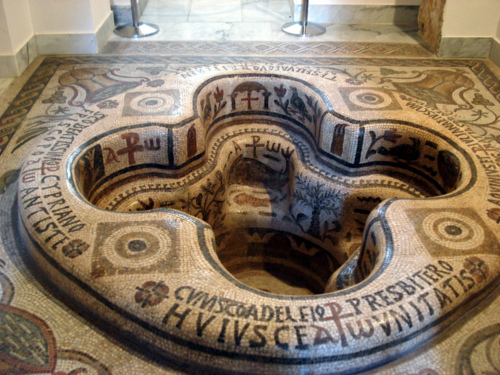Lectionary #30
Exodus 3:1-8a, 13-15
1 Corinthians 10:1-6, 10-12
Luke 13:1-9
Repent! It is a word that is out of fashion. It is a command that conjures images of a crazy person wearing a sandwich board sign that reads “The End is Near!” It is a word that many of us do not take seriously or apply to ourselves with any frequency. I had a rather unfortunate conversation recently with a man who told me rather proudly that he is “a recovering Catholic.” He told me that he couldn’t be part of the church because it was an institution that just makes people feel badly about themselves. The Church tells us we’re inadequate, not good enough, bound for hell, etc. It makes us feel guilty and calls us sinners. It’s so horrible he’s been recovering from the experience for the last forty years. Mostly, I wanted to say “Get over it!” but instead I merely said mildly that hadn’t been my experience of the church. I should have asked this man if he had noticed that the church and world had changed in the last few decades. We live in an age of self-congratulation that prizes self-esteem. We live in an age where many people have difficulty recognizing any fault in themselves and don’t seem to know how to construct an apology in a way that admits actual guilt (“I’m sorry if you took offense at something I did” doesn’t count!). If anything, these days we are taught never to judge others or even to judge ourselves.
And yet this week’s readings, call us to recognize our need for repentance. “Whoever thinks he is standing secure should take care not to fall.” The Gospel reading also makes plain the fact that we are all sinners and all of us need to repent. It is not easy to recognize our own shortcomings, especially in a culture where there is little room for introspection or moral judgment. And yet we must heed the warning from Jesus: “But I tell you, if you do not repent, you will all perish as they did!”
In the Gospel, the threat for those who won’t repent seems at first to be that Pilate will kill you and mix your blood with pagan sacrifices or a tower may just happen to fall over on you. Today, that seems like a rather remote or even superstitious way of thinking. I (like many Christians today I suspect) have trouble believing that God is vindictive and curses people with calamities. Once we write off the threat of punishment it becomes easy to dismiss the call to repentance simultaneously. But that would be a mistake.
If we look more closely at today’s Gospel, we see that it is actually the concluding parable that points to the real cost if we fail to repent. We won’t suffer a plague, a tower won’t topple on us, but in some sense our lives will be barren. We will fail to bear fruit. “Whoever thinks he is standing secure should take care not to fall.” Lent is a time to take an honest look at ourselves, and to change our ways that we might bear fruit.
Whenever I think of the command “Repent!” my mind always wants to add “And believe the good news!” (Mark 1:15). Ironically, it is the Old Testament reading this week that sheds light on what constitutes the Good News. In short, the good news is that God Is, and God is with us. Although this passage from Exodus makes clear that God is truly God – existing outside of time in a perpetual “I AM,” God is also present in history. This is not a distant impassible God, but one who hears our cries and acts to save us. In the midst of suffering, we know that God is with us, and we believe that we will find our final end with this “I AM.”
Recognizing God’s holiness is something that should be closely linked to repentance. To repent is not just to recognize our faults; it is to be awakened to our desire to be with God. It is to grow in appreciation of the holy. It is to be like Moses, drawn to the fire of God’s presence even while feeling the need to hide our faces. May we find the time to be conscious of the Power of God’s presence this Lent. May it be an occasion for us to repent so that we may draw nearer to God and so that our lives will bear much fruit.




Trackbacks/Pingbacks